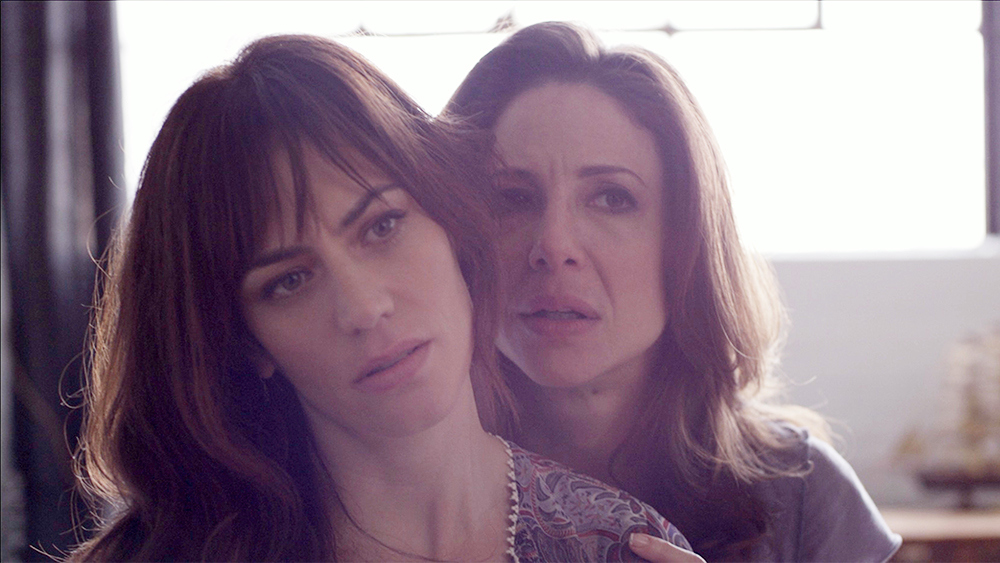Robin Weigert Hits It On the Head

ABOVE: MAGGIE SIFF (LEFT) AND ROBIN WEIGERT IN CONCUSSION.
In Concussion, a bored, well-to-do housewife takes up an unusual “finding herself” hobby: prostitution. Feeling unloved by her wife Kate, Abby buys a run-down apart in New York City to renovate. With the help of her contractor, she begins bringing clients—generally young, insecure women and one yummy mummy from her town played by Maggie Siff–back for 800 dollars each. As her “hooker name,” she chooses Eleanor. “I love it for its sort of old-fashioned prissiness,” actress Robin Weigert laughs over the phone.
The first film from writer-director Stacie Passon, Concussion draws its title from the event that seemingly spurs this lifestyle change: when Abby is hit in the face by a ball thrown by her son. Not exactly a model parent, Abby promptly calls him a “little shit.”
A graduate of NYU, Weigert’s résumé is one of cult television shows—Deadwood, Sons of Anarchy—and indie films, such as Synecdoche, New York and The Private Lives of Pippa Lee. Since Concussion premiered in January at Sundance, however, the actor’s career has blossomed. One project she is particularly excited about when we talk to her is a pilot for Showtime she has just finished filming with Phillip Seymour Hoffman.
EMMA BROWN: Have you ever had a concussion in real life?
ROBIN WEIGERT: I played the witch in Hansel and Gretel when I was a little girl. When my part was done, I started rocking back and forth in the little basket that was the stove where the witch was burned. I rocked myself right off the edge of the stage, and landed on my head, so I did get a tiny little concussion then. [laughs] That was the auspicious beginning of my acting career. So I actually do have an answer to that question. [laughs]
BROWN: Was that during an actual performance or during a rehearsal?
WEIGERT: It was during a performance, one of our three performances in the second grade or whatever it was. I remember running down the aisle with my little broomstick, and it was so much fun.
BROWN: Were you happy to be playing the witch or did you want to be Gretel?
WEIGERT: Oh, no, no, no. I had no interest in Gretel whatsoever. I completely wanted to be the witch. I was very happy with my part. I just wanted there to be more of her. I even remember the lyrics that they came up with, which were “nibbling, cribbling mousey who nibbles on my house-y,” and I got to chant that as Hansel and Gretel approached the house. It is indelible. I think I’ve always liked playing the wicked witch more than I’ve liked playing Gretel, to be honest with you, which is why I’ve been drawn to so many different character parts, I think.
BROWN: Do you think there’s a future for Abby and her wife Kate?
WEIGERT: Yes, and it depends what you mean by future. I think the greatest hope for any couple is when the truth is out between them. The truth is on the table between them. It allows them to mutually decide what to do, and neither of them is at a disadvantage in that decision-making process. To be fair to Abby for what most people might deem her morally egregious behavior, I think the movie really creates a certain balance between them because Abby says to Kate, “So I only belong to you, but you don’t want me?” And Kate says to Abby, “I don’t want anybody, Abby.” Suddenly there’s an incredible balance between these two. There’s an acknowledgment, and then they have some choices to make. I don’t know why I see that as so hopeful, because it doesn’t mean their marriage will last and it doesn’t mean that it won’t. It just means they’ll now be able to have a truthful conversation.
BROWN: I definitely saw that as a heartbreaking moment.
WEIGERT: Well, it’s an adult moment of recognition without blame.
BROWN: Normally when you encounter prostitution in films, there’s some sort of exploitation going on.
WEIGERT: I think the way Stacie [Passon] set it up within the film, some of it even to comedic effect, really loudly broadcasts how different this scenario is from the typical scenario. Abby sets up a little tea or coffee beforehand to make sure she likes the client; she makes sure she’s safe the way that one would before taking a trip to India, say, by getting inoculation shots and things. She does it in the most empowered, upper-middle-class way imaginable, with as many safeties in place as she can conceive of, entirely on her own terms. It is not a familiar form of prostitution.
BROWN: Do you think you could have retained that dynamic if she saw male patrons as well?
WEIGERT: Lewis C.K. has this whole comic riff on how incredibly unsafe and insane it is that women will go out on dates with men when they say, “Come in my car with me and let me take you somewhere,” when they [the women] don’t know them yet. He has good fun with that idea in his riff, but there is something, of course, inherently more dangerous about being a prostitute for men because there’s an imbalance physically. A man is able, typically, to overpower a woman, and her only defense is a “no” that very well might not be listened to.
I didn’t engage in research about sex work for this because I didn’t see it that way. I saw this as very specifically this character’s journey taking one step after another outside the box and trying to find herself. It didn’t resemble to me anything that felt like real-world prostitution. But Stacie had done some research.
BROWN: I heard that you were the one that suggested Maggie Siff.
WEIGERT: Yes. There’s a lot of trust and mutual respect there and we like each other and we like each other’s work. We both went through the same school.
BROWN: Is that how you first met—though school?
WEIGERT: It may have been at the West Bank Café after a play when she was hanging out with other people I knew, and we might have ended up at the same table and started chatting. It was definitely before Sons of Anarchy that we knew each other.
BROWN: Can you tell me a little bit about how you got involved in the film?
WEIGERT: In a very unusual way, in my life anyway, which is to say I got an offer from a stranger. It wasn’t even degrees of separation. We really didn’t know each other, and somehow she had gleaned from my body of work, which to my mind in no way would suggest it, that this was a part I could play, and offered it to me. I, intellectually, wasn’t sure if I wanted to say yes because it was a risky project with somebody whose work I couldn’t even look at. I couldn’t watch another film and see her style was or what her sensibility was. I only had what was on the page. [But] I found that I had already started working on it—clearly some part of me had already embraced it—before I had fully accepted the part.
BROWN: When Abby has her first encounter with prostitution, she debates whether telling Kate would be selfish. Do you think telling Kate at that time would have been selfish?
WEIGERT: To talk about something [like that], the other person then becomes the wild card that will have a response, and it may not be the response you want. Sometimes I think saying it would be selfish to tell them is still being under the illusion that you have all the power. You say it would be selfish to tell them, when in fact you’re scared that in telling them, it gives them the power to do what they might want to do because once they know, they become somebody who could be reactive.
BROWN: I heard that you come from a long line of therapists. Is that true?
WEIGERT: [laughs] Yes, yes. You probably hear it just now; it’s this unavoidable way of looking at the world. My father was a psychotherapist, and so was his mother. Sometimes I’ve found in these interviews that I’ve detected something in the questioner that has made me want to flip the interview around and ask them questions about themselves. I know that’s not what they’re designed for, but it is my natural bent. I’m curious about people, and I’m curious about getting to the root of where they might be coming from. It’s been particularly interesting with this film, which is such a Rorschach, how often I’ve been tempted to wanted to say, “What an interesting question, why do you think you’re asking that?” [laughs] People will project their lives onto this film and not even know they’re doing it. Heterosexual women ask questions that are a lot to do with what I did to my body and what that was like to lose all that weight and so on. To me it just reveals that that’s a preoccupation of theirs. Or gay women have been really keen on knowing how I felt about playing a gay character and have often wanted to talk about their own experiences with children. Straight men have often shown some sense of relief, that they get to experience the philanderer as a woman and not have to judge her in the same way. That’s fascinating to me.
CONCUSSION COMES OUT IN LIMITED RELEASE TODAY, OCTOBER 4.






